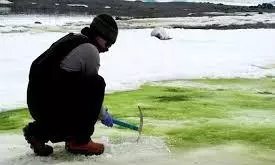
Antarctica's rapid greening signals impact of climate change: study
text_fieldsAntarctica's frozen landscape, known for its icy expanses, is seeing an unexpected surge in plant life, primarily mosses, as extreme heat events and climate change reshape the continent.
Researchers from the Universities of Exeter and Hertfordshire analyzed satellite imagery and vegetation data, finding that green cover has expanded from just 0.4 square miles in 1986 to nearly 5 square miles by 2021 - a 10-fold increase over four decades.
According to a report in Nature Geoscience, this shift has accelerated in recent years, with vegetation spreading over 30% faster between 2016 and 2021.
Thomas Roland, an environmental scientist from the University of Exeter and co-author of the study, expressed concern over the findings. "Our study confirms the profound reach of human-driven climate change," Roland stated. "Even Antarctica, one of the planet's most isolated and extreme environments, is visibly transforming, detectable from space."
At a recent conference in Chile, scientists and researchers deliberated whether these extreme changes could signify a tipping point for Antarctica, where accelerated and irreversible ice loss might become unavoidable. Climate specialists, such as New Zealand’s Victoria University of Wellington's Liz Keller, highlighted the alarming pace of carbon dioxide increase, noting that the rise seen over thousands of years has now unfolded in just a century.
Antarctica’s severe temperature anomalies have added to the concern.
Temperatures have spiked up to 50 degrees Fahrenheit above normal during summer months, and in March 2022, parts of the continent hit a record-breaking 70 degrees Fahrenheit above average. These trends, scientists warn, could herald more rapid and profound environmental changes in the world’s coldest and most remote region.






















